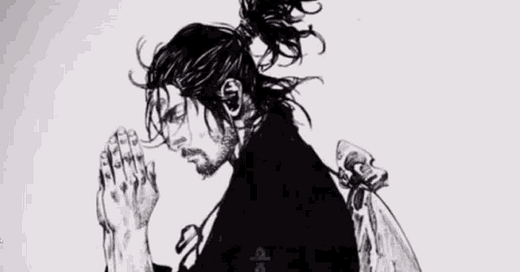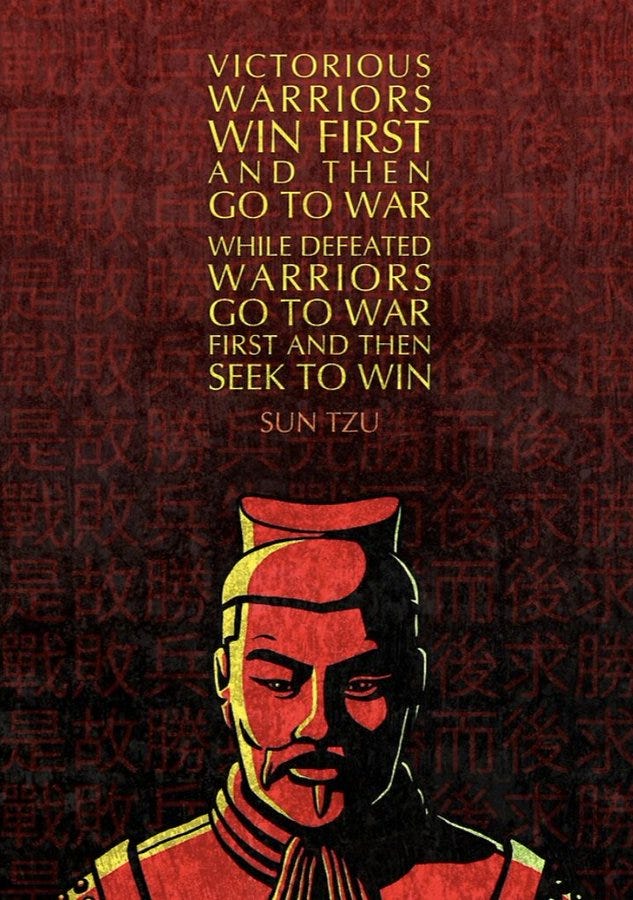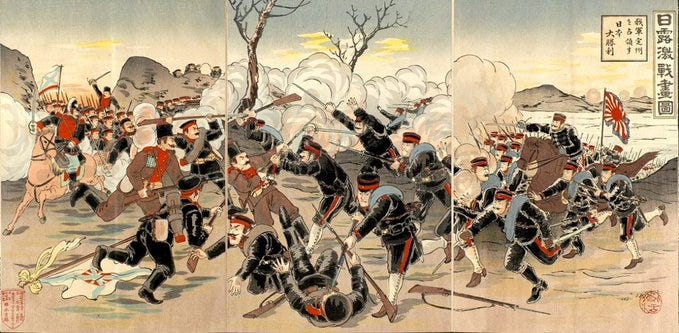Bonjour Les Amis
Prologue:
“Victorious warriors win first and then go to war, while defeated warriors go to war first and then seek to win” - The Art of War
Deep into the vigil in the night, I am sitting at my desk, rocking in my now creaky office chair (need to replace this shit) vigorously thinking through something I have been tirelessly working on.
I can almost hear the deafening silence of the entire city due to how late it is.
Something just struck me. Most, if not all of my time, in the past six to eight months has been devoted to a direction that provides no immediate gratification.
My friends, we call this - playing the long game.
It is difficult to play the long game and it requires unique character traits to endure the daily monotony of tasks that are far from glamorous and do not provide the high of quick turn-around gratification.
I do not want to enter into a war and then seek to win.
I desire to have my pieces positioned on the board in advance, allowing for a minimal number of moves to draw a checkmate.
At this exact moment, I thought about how “The Art of War” can be a useful and relevant framework to be considered.
The Art of War is a book that reads like cryptic poetry fixating on strategies and a methodology to think of war, by a legendary military strategist and philosopher in the form of Sun Tzu.
I believe this text is relevant when it comes to being in the arena of financial speculation which we call the Market. In this particular arena, there is no real blood that is being shed. However, much of the proverbial red is in our portfolios.
Before I blabber on further, let’s get into some of the insights that I have extracted from The Art of War:
1. Use your Brain in a Probabilistic Manner
"Now the general who wins a battle makes many calculations in his temple ere the battle is fought. The general who loses a battle makes but few calculations beforehand".
Robot James is one of my favorite follows.
The common theme throughout the book is a highly calculated approach, laden with situational awareness.
"In respect of military method, we have, firstly, Measurement, secondly, Estimation of quantity; thirdly, Calculation; fourthly, Balancing of changes; fifthly, Victory."
Yes, there is only so much you can plan for. However, repeating this process of computing probabilities of outcomes and thinking through potential workarounds can have the side effect of improving the ability to be adaptable in the market.
2. 𝐔𝐧𝐝𝐞𝐫𝐬𝐭𝐚𝐧𝐝𝐢𝐧𝐠 𝐨𝐟 The 𝐒𝐞𝐥𝐟 & 𝐓𝐡𝐞 𝐀𝐫𝐞𝐧𝐚
"If you know the enemy and know yourself, you need not fear the result of a hundred battles."
An understanding of the self is vital to position for "battle". Also, Sun impresses upon avoiding "long drawn out campaigns".
In other words, the battle must be fought in a strategic manner.
Energy must be conserved to position in an advantageous manner to maximize the odds of winning before the metaphorical battle even begins.
Understand when to enter the arena and when to retreat.
The key point is to retreat with the intent to attack when the conditions are in your favor. This is a shift in mentality, even in defense you possess an “attack” mentality.
"Knowing the place and the time of the coming battle, we may concentrate from the greatest distance in order to fight."
3. “𝐈𝐭 𝐢𝐬 𝐨𝐧𝐥𝐲 𝐨𝐧𝐞 𝐰𝐡𝐨 𝐢𝐬 𝐭𝐡𝐨𝐫𝐨𝐮𝐠𝐡𝐥𝐲 𝐚𝐜𝐪𝐮𝐚𝐢𝐧𝐭𝐞𝐝 𝐰𝐢𝐭𝐡 𝐭𝐡𝐞 𝐞𝐯𝐢𝐥𝐬 𝐨𝐟 𝐰𝐚𝐫 𝐭𝐡𝐚𝐭 𝐜𝐚𝐧 𝐭𝐡𝐨𝐫𝐨𝐮𝐠𝐡𝐥𝐲 𝐮𝐧𝐝𝐞𝐫𝐬𝐭𝐚𝐧𝐝 𝐭𝐡𝐞 𝐩𝐫𝐨𝐟𝐢𝐭𝐚𝐛𝐥𝐞 𝐰ay of carrying it on”.
Reading books is great and I am a huge proponent of indulging yourself in this practice.
Shameless plug, I recently created an open Twitter community by the name of CTBC- Crypto Twitter Book Club. Feel free to join and engage if interested.
However, I would stress upon the fact that external knowledge is beneficial only if you are working to create your own experience. You can read all the books on investment & trading that you want. It is all utterly useless unless you step foot into the battlefield.
You just need to jump in the mud and get dirty to understand what it is to make and lose money.
“One may know how to conquer, without being able to do it.”
Making money is half the battle, and keeping it is another behemoth.
Pentoshi lays this out so I don’t have to:
The goal isn’t just to get mud on yourself.
It is to learn with every splatter of mud that gets on you.
Each of these splatters is a valuable opportunity, if and only if, you are prepared to treat it as such.
4. “In the midst of chaos, there is also opportunity.”
I harp on this quite a bit. Observe the general sentiment of the masses when there is chaos. One event of note (there are many others) was the USDC depeg. Much to be learned there.
“It takes a seasoned mind to stay calm during periods of frenetic activity.”
Individuals who can remain relatively calm and assess situations in a rational manner tend to spot opportunities in the midst of chaos.
There are people who wait to feast on these opportunities of chaos when they come along. They sit out completely and observe the rest of the time.
5. “Water shapes its course according to the nature of the ground over which it flows; the soldier works out his victory in relation to the foe whom he is facing.”
One thing to keep in mind is victory might not always be an exact match to the victory that you have in mind.
Being able to determine when you have come across a win might be tricky at times, especially when operating in the grind of playing the long game.
This is where being mindful of small milestones being reached can go a long way. An analogy to fighting in a war, Sun Tzu lays out the importance of winning small skirmishes to establish momentum. Each small battle won can give a military a greater chance of winning the overall war.
Just as a drop of water falling repeatedly onto a slab of stone will carve right through it over time, you would be surprised to see how far the consistency of performing the seemingly small mundane tasks can get you in a year (speaking from personal experience).
Concluding Remarks
I am always looking for opportunities to find a cross-over between multiple seemingly disconnected realms. I have always strived to be a “Renaissance Man”. The best cross-overs are the ones that just fall into my lap, unforced.
Why do I seek this? Because I truly believe this is where I get my best “AHA moments” and it leads me to breakthroughs/new discoveries.
Hope this was an insightful discussion for you.
Until next time.
Stoic out.















